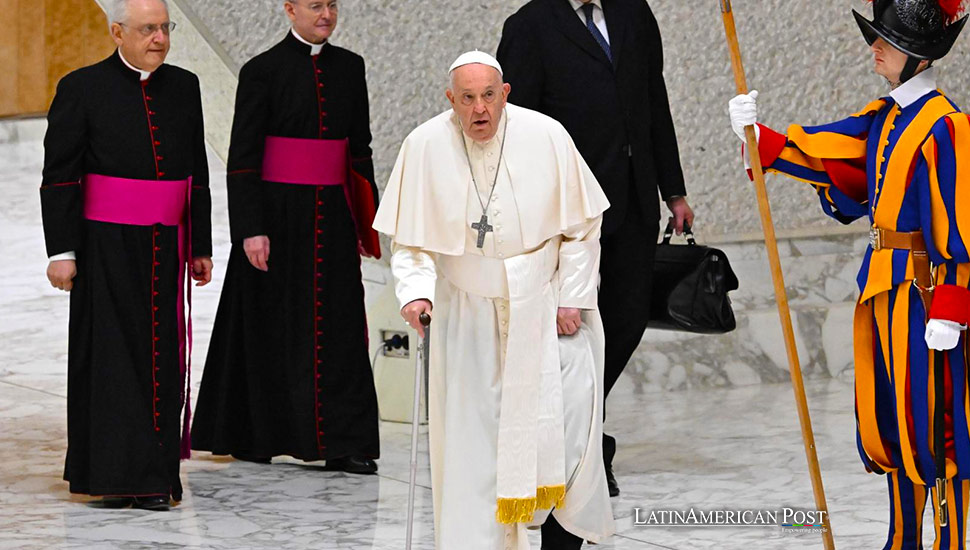Argentina’s Pope Francis to Address AI Ethics at G7 Summit in Italy

Pope Francis will participate in a dedicated session on Artificial Intelligence at the G7 summit in Apulia, Italy, marking the first time a pontiff has attended the gathering of the world’s wealthiest democracies.
In an unprecedented move, Pope Francis is set to attend the upcoming G7 summit, scheduled from June 13 to 15 in the picturesque region of Apulia, southern Italy. This marks the first time a pope will participate in the high-profile gathering, highlighting the increasing intersection between global leadership and technological ethical considerations. The announcement was made by Italian Prime Minister Giorgia Meloni, whose country currently holds the rotating presidency of the G7.
G7 Summit Explores AI: Setting the Stage for Ethical Governance
The G7, comprising Germany, Canada, the United States, France, Italy, Japan, and the United Kingdom, traditionally discusses global economic policies, security, and other pressing issues. This year’s summit, however, will also delve into the complexities of Artificial Intelligence (AI) — a topic that Prime Minister Meloni describes as “the greatest anthropological challenge of our time.”
During the summit, leaders will convene at the Borgo Egnazia hotel complex to discuss a range of topics, including the ongoing support for Ukraine in its conflict, efforts to secure peace in the Middle East, and strategies for addressing the climate crisis and food security. A significant focus will also be on developing countries and migration issues, particularly concerning Africa and the battle against human trafficking.
The inclusion of AI on the agenda underscores the profound impact this technology is anticipated to have on global societies and economies. AI presents substantial opportunities but poses risks that could disrupt social and economic stability worldwide. Recognizing these challenges, Meloni emphasized the need for robust governance to ensure that AI remains under human control, advocating for a global ethical reflection on its use and development.
Vatican’s Influence on AI Discourse
This focus on AI ethics aligns with the Vatican’s initiatives, notably the “Rome Call for AI Ethics.” Launched in 2020, this initiative promotes “algor-ethics,” or the ethical application of algorithms, to ensure AI development aligns with human dignity and societal values. Pope Francis has shown considerable interest in this area, often addressing the moral implications of technology in his messages, such as his statement for this year’s World Day of Peace, where he highlighted the potential risks of AI to peace and human survival.
The Pope’s participation is especially significant as it brings a unique moral perspective to discussions often dominated by economic and political considerations. His presence at the AI session aims to steer the conversation towards a more ethically informed discourse, ensuring that technological advancements benefit all of humanity without compromising ethical standards.
Moreover, the G7’s invitation to Argentine President Javier Milei, among other leaders, to participate in sessions typically reserved for non-member countries indicates a broader desire to include diverse perspectives in these critical discussions.
The Italian presidency hopes to leverage the Vatican’s moral authority and the ethical framework proposed by the “Rome Call for AI Ethics” to foster a deeper understanding among G7 leaders of the ethical stakes involved in AI development. Meloni’s goal is to have these leaders adopt a more conscientious approach to AI that prioritizes ethical considerations as much as technological and economic ones.
Shaping International AI Policies
As the summit approaches, the world will watch how these leaders navigate the complex technology, ethics, and governance matrix. With AI rapidly becoming an integral part of modern life, the decisions made in Apulia could shape international AI policies for years.
Pope Francis’ role in these discussions is symbolic and a substantive push towards a global consensus on how AI should be governed. By integrating ethical dimensions into the discourse on AI, the G7 summit in Apulia is set to be a pivotal moment in defining the future relationship between technology and humanity.
Also read: Argentina and Spain Harness Volcanic Subsurface Heat for Sensor Power
As global leaders and the Pope gather in the historic setting of Apulia, the discussions will likely resonate beyond the confines of the summit, influencing international policies and the global public discourse on the responsible use of AI. The outcome of this summit has the potential to set ethical benchmarks that could guide the development and implementation of AI technologies worldwide, reflecting a collective commitment to harnessing technology for the good of all, anchored in deep ethical considerations.





